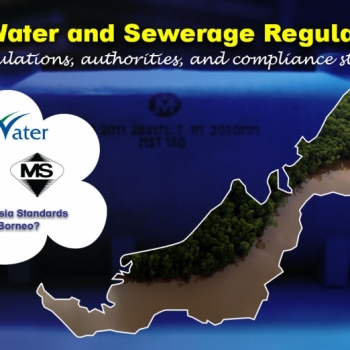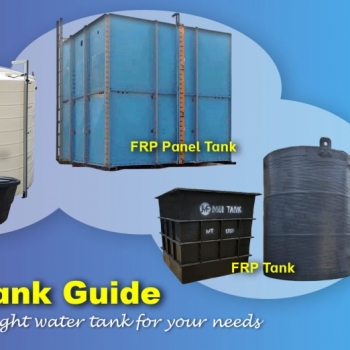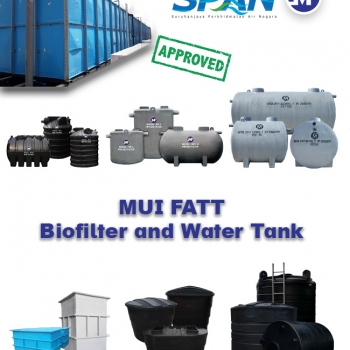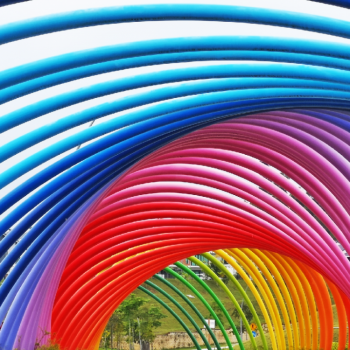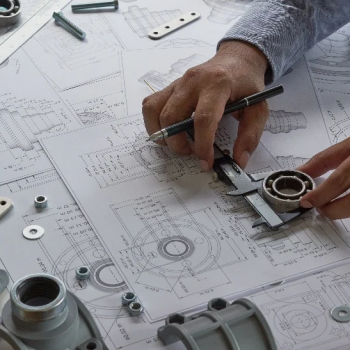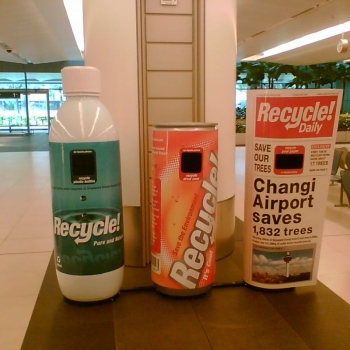Understand the regulations and guidelines for water and septic tanks in Borneo, plus compliance with SPAN, IWK, and SIRIM standards in Malaysia.
Understanding Recycle Bins: Types, Uses, and Regulations in Malaysia
12 Nov 2024
Understanding Recycle Bins: Types, Uses, and Regulations in Malaysia
Understanding Recycle Bins: Types, Uses, and Regulations in Malaysia
- Key Takeaways
- What is a Recycle Bin?
- Types of Recycle Bins
- Why Use a Recycle Bin?
- Waste Segregation Regulations in Malaysia
- Malaysia's Waste Management Challenges and Recycling Solutions
- Recycling in Malaysia: Are We Successful?
- Mui Fatt's Role in Supporting Malaysia's Recycling Efforts
- Conclusion: Encouraging Responsible Waste Practices
- Frequently Asked Questions
- What is the difference between recyclable and reusable items?
- Why is using a recycle bin important?
- What materials are commonly used in recycle bins?
- What types of recycle bins are available by color and purpose?
- Are there waste segregation regulations in Malaysia?
- How effective is Malaysia’s recycling system?
- What should I do with food waste?
- Where can I purchase durable recycle bins in Malaysia?
Key Takeaways
- Learn the Basics: Understand what recycle bins are, key terms like "recycle" vs. "recycling," and why waste segregation is essential.
- Types and Materials: Discover the various types of recycle bins available by color, design, and material to find the best fit for your needs.
- Regulations in Malaysia: Learn about Malaysia’s waste segregation regulations and the role of recycling in promoting sustainability.
- Practical Insights: Explore differences between recyclable and reusable items, and check out customizable recycling bins by Mui Fatt.
What is a Recycle Bin?
As manufacturers dedicated to producing high-quality recycling solutions, we believe it’s crucial to start with the basics. Recycle bins, also known as recycling bins or receptacle bins, are containers designed to sort and store recyclable materials like plastic, glass, and paper. By separating recyclables from general waste, we contribute to environmental preservation, cleaner spaces, and sustainability.
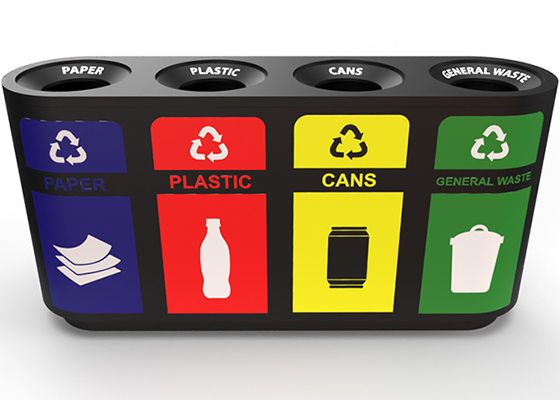
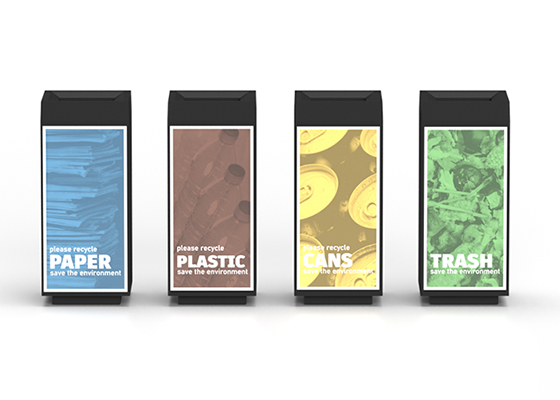
Types of Recycle Bins
Choosing the right recycling bin depends on the materials and design that best meet your needs, especially when considering residential recycling bins for various recyclable wastes. Let’s explore the different types of recycling bins available for proper disposal.
By Color: Standard Color Codes
In Malaysia, while there is no universal color standard, Malaysia's Waste Management Association recommends color-coding for recycling bins:
-
Blue for paper
-
Brown for glass
-
Orange for plastics and metals
Contrary to this, combining plastics and metals may reduce sorting efficiency, so separating materials as much as possible is ideal for recycling.
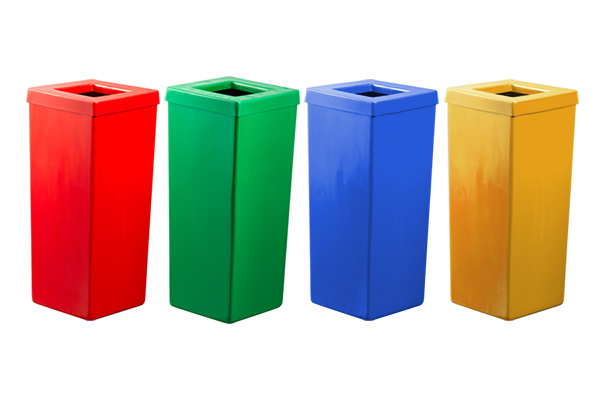
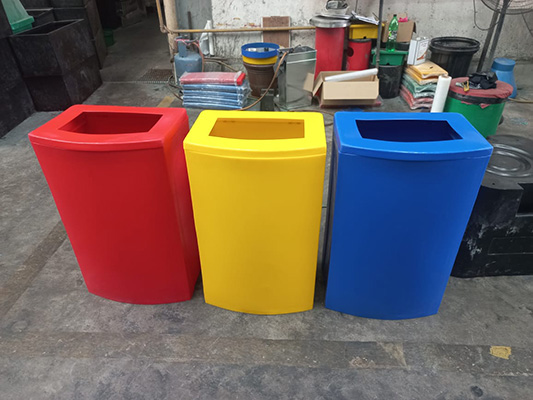
Mui Fatt’s customizable options allow for personalized color coding and stickers, ensuring clarity and ease of use for recycling in any setting. Color-coded bins support waste segregation, encouraging proper disposal practices.
By Material: Common Materials Used in Recycle Bins
We manufacture recycle bins in Fiberglass Reinforced Plastic (FRP) and Polyethylene (PE).
-
Fiberglass-Reinforced Plastic (FRP) Bins: Highly durable, suitable for high-traffic or outdoor areas.
-
Polyethylene (PE) Bins: Lightweight, impact-resistant, and ideal for indoor or outdoor use.
These materials are chosen for their durability, weather resistance, and environmental benefits.
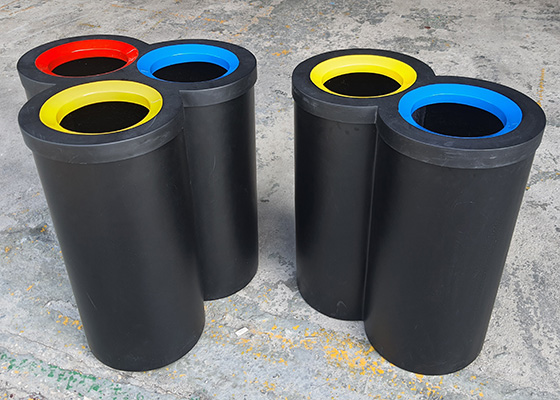
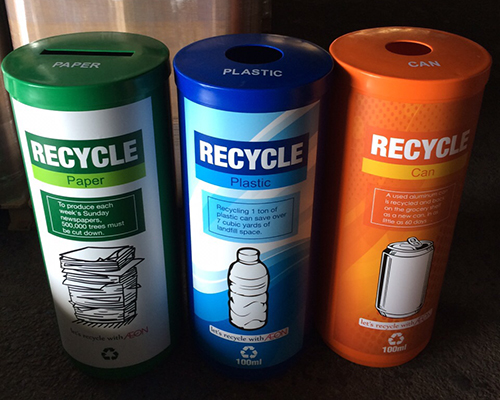
By Design: Variations in Shape and Size
Recycle bins come in diverse designs, from traditional cylindrical bins to stackable or specially shaped bins for bottles, cans, and paper. At Mui Fatt, we provide customizations to match aesthetic or functional needs, with stickers and colors aligned with local recycling requirements.
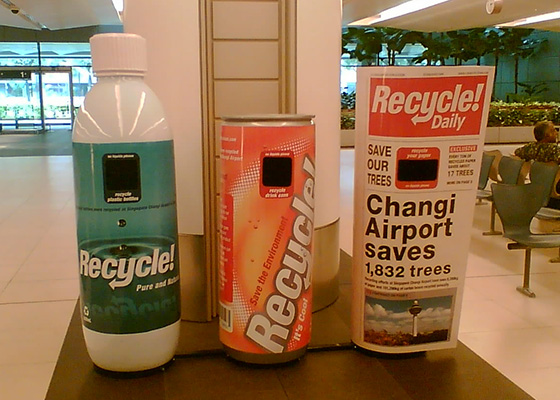
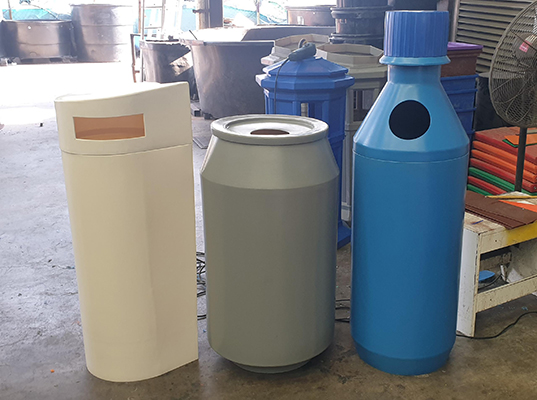
Why Use a Recycle Bin?
Using recycle bins is essential to separating waste streams, which minimizes landfill waste, reduces pollution, and conserves valuable resources.
Key Terms: Recyclable vs. Reusable
-
Recyclable: Materials like plastics, paper, and glass that can be broken down and reprocessed.
-
Reusable: Items that can be repurposed without additional processing, such as tote bags or glass jars.
Knowing these distinctions empowers individuals to make responsible choices about waste management.
Waste Segregation Regulations in Malaysia
In 2015, Malaysia introduced mandatory household waste segregation laws, requiring recyclables to be separated from general waste. This regulation aims to increase recycling rates and reduce landfill dependency. More information can be found on Malaysia’s official Solid Waste and Public Cleansing Management Corporation (SWCorp) website.
Common Users of Recycle Bins
Recycling bins are utilized by a wide range of sectors, including residential recycling bins that help manage various materials like plastic waste and food waste effectively.
-
Households: Everyday waste segregation, supported by color-coded bins.
-
Businesses: Offices, retail outlets, and commercial spaces use bins to sort plastics, paper, glass, and metal waste for more efficient recycling.
-
Industries: Factories and industrial areas need robust bins for handling large volumes of recyclable waste.
Types of Recyclable Waste and Recommended Sorting
In Malaysia, common recyclables include plastics, metals, paper, glass, food waste, e-waste, and textiles. Simple separation practices—such as placing plastics and paper in designated bins—can significantly improve recycling efficiency.
Malaysia's Waste Management Challenges and Recycling Solutions
Malaysia faces serious waste management issues, with RM291 million worth of recyclables lost in 2023 due to inadequate recycling, resulting in a recycling rate of 33.17% - short of the 40% target for 2025. Contributing factors include rapid population growth, limited infrastructure, and insufficient waste separation at the source, which increase landfill pressure and environmental pollution.
Textile and Food Waste Concerns
Textile waste makes up around 5% of landfill content, while food waste, at 30.6%, is the largest component of household waste. As landfills near capacity, recycling and waste reduction efforts are critical.
Circular Economy and Waste-to-Energy (WTE) Initiatives
The Circular Economy Blueprint for Solid Waste (2025-2035) outlines Malaysia's plans for waste-to-energy plants that meet European emissions standards. These WTE plans aim to reduce landfill dependence by converting waste to energy while controlling pollutants to protect the environment.
Recycling in Malaysia: Are We Successful?
While Malaysia’s recycling rate has improved, significant challenges persist, especially with plastics and food waste, which cover a large portion of landfill waste. When food waste decomposes in landfills, it releases methane gas - a potent greenhouse gas that traps heat in the atmosphere. Composting or using anaerobic digesters could transform food waste into valuable compost or energy, reducing landfill burden and environmental impact. Malaysia needs enhanced public awareness, expanded infrastructure, and the introduction of composting solutions to improve the recycling system.
Mui Fatt's Role in Supporting Malaysia's Recycling Efforts
Mui Fatt is dedicated to advancing Malaysia's recycling goals through high-quality recycling bins and waste segregation solutions. Our FRP and PE recycle bins are designed to facilitate effective sorting at the source, a critical step in efficient waste management. With customizable color and labeling options, our bins make it easy for households, offices, and public spaces to adopt responsible waste practices.
Choosing the Right Recycle Bin for Your Needs
Selecting the right recycle bin depends on factors such as size, material (FRP or PE), durability, and customization requirements. FRP bins are ideal for high-traffic areas, while PE bins are lightweight and versatile for indoor use.
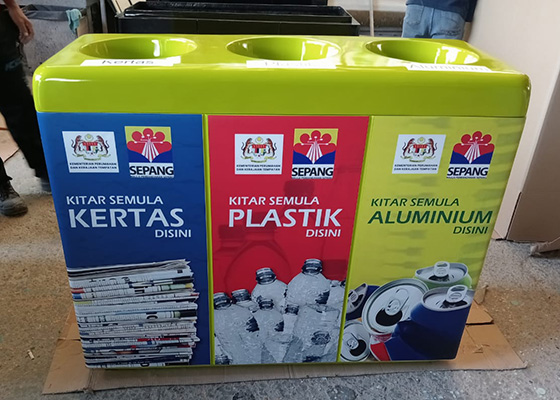
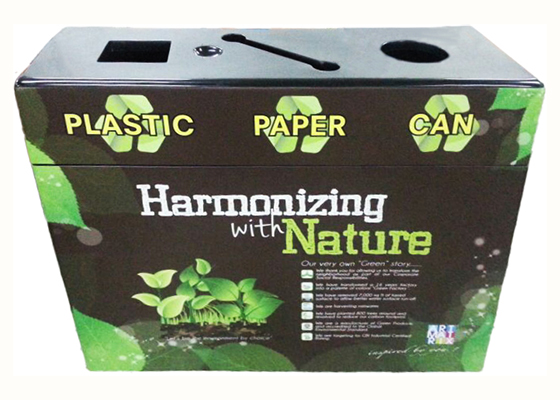
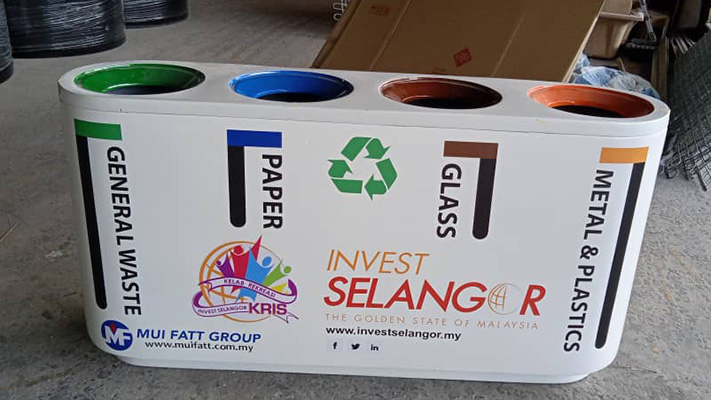
Conclusion: Encouraging Responsible Waste Practices
Malaysia's commitment to a more sustainable future is evident in its Circular Economy Blueprint and new waste management initiatives. Public participation is crucial for these efforts to succeed. Using Mui Fatt's recycle bins, individuals and businesses can help reduce landfill contributions, protect the environment, and contribute to a circular economy. Contact us today via WhatsApp or email at sales@muifatt.com.my to explore our selection and find the ideal recycling solution for your space.
Frequently Asked Questions
What is the difference between recyclable and reusable items?
Recyclable items, such as plastics and aluminum cans, can be processed to create new products, while reusable items can be repurposed without additional processing.
Why is using a recycle bin important?
Recycle bins enable waste segregation, reducing landfill waste, pollution, and conserving resources.
What materials are commonly used in recycle bins?
Common materials include Fiberglass Reinforced Plastic (FRP) and Polyethylene (PE) for their durability and environmental benefits.
What types of recycle bins are available by color and purpose?
Recycle bins are often color-coded (e.g., blue for paper, brown for glass, and orange for plastics and metals) to simplify the sorting of recyclable materials.
Are there waste segregation regulations in Malaysia?
Yes, Malaysia introduced mandatory household waste segregation in 2015 to support sustainable waste management, including the use of recycling bins for proper disposal of recyclable wastes.
How effective is Malaysia’s recycling system?
Malaysia’s recycling system has made progress but needs improvements in infrastructure and public awareness.
What should I do with food waste?
Composting is an ideal solution for food waste, as it prevents methane emissions from landfills and provides nutrients for soil.
Where can I purchase durable recycle bins in Malaysia?
Mui Fatt offers a variety of customizable FRP and PE recycle bins, suitable for both indoor and outdoor use.
Disclaimer:-
The information provided on this website is for general informational purposes only and does not constitute legal advice. While we strive to ensure the accuracy and reliability of the information provided, we make no representations or warranties of any kind, express or implied, about the completeness, accuracy, reliability, suitability, or availability concerning the information contained herein. Any reliance you place on such information is therefore strictly at your own risk. This website may contain links to other third-party websites. Such links are only for the convenience of the reader, user, or browser; which we do not warrant, recommend, endorse, or assume liability for the contents of the third-party sites.
Keep in touch with us should you be keen on receiving timely updates from us
- Website - https://www.muifatt.com.my/home/
- Facebook - https://www.facebook.com/muifattmarketing
- Instagram - https://www.instagram.com/muifattmarketing/
- Google - https://goo.gl/maps/WxVY13gNcaRTS7Jp6
- Youtube - http://www.youtube.com/@MuiFattMarketing
- TikTok - https://www.tiktok.com/@muifattmarketing
- LinkedIn - https://www.linkedin.com/company/mui-fatt-marketing-sdn-bhd-
- Linktree - https://linktr.ee/muifattmarketing
- Shopee - https://www.shopee.com.my/muifattmarketing
- Lazada - https://www.lazada.com.my/shop/mui-fatt-marketing
Recent Blog
Essential Guide to Choosing the Right Water Tank for Your Needs
A step-by-step guide on water tank considerations, including material, size, application, and more. Learn how to pick the perfect tank for your needs.
Why SPAN-Approved Water and Septic Tanks Are Essential for Your Project
In this blog, we explore why using SPAN-approved water and septic tanks is critical for compliance, safety, and reliability in construction projects across Malaysia. Learn how SPAN certification ensures the quality of your tanks, and why it’s essential for maintaining water service standards under Act 655. Discover how various end-user products such as water tanks and septic tanks adhere to this legislation and the consequences of non-compliance, emphasizing the importance of strict adherence for safeguarding Malaysia's water resources and public well-being.
Unleash the Potential of Architectural Color Preservation with Unsaturated Polyester Resin Coatings
Discover our advanced UPR protective coatings, expertly designed to safeguard architectural structures and preserve color pigments. Explore the application process, benefits of reinforcement, various UPR types, and other methods for maintaining vibrant colors in architectural designs.
The Role of Industrial Design in Creating Visually Appealing and Functional Products
Discover the world if industrial design, where creativity meets functionality. Learn how industrial designers shape the form and usability of products across industries. Explore the process, trends, and importance of industrial design in creating innovative and user-centered solutions.
Enhancement of Waste Management System
The three main components of a waste management system are trash bins, recycling bins and dumpsters.
